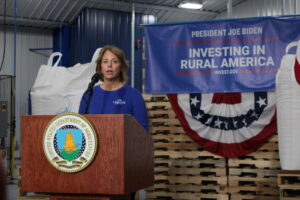Edge member Sandy Larson of Larson Acres presented at a United States Department of Agriculture Partnerships for Climate-Smart Commodities event. She spoke about the values important to her every day on her family’s farm: quality, pride and family and also how these values are reinforced in her work through the Farmers for Sustainable Food Climate-Smart Program.
Larson is a fifth-generation dairy farmer from Rock County, Wis., who farms alongside three generations of family members. Larson Acres was established in 1957 and today consists of 75 employees, 2,800 cows as well as more than 5,000 acres of farmland.
“Successfully teaching and passing the farm to the next generation is important to us. That is our vision at Larson Acres,” Larson said. “We do this by upholding our values in how we live every day.”
As a member of the Lafayette Ag Stewardship Alliance and Farmers for Sustainable Food, Larson participated in a pilot sustainability project from 2019 to 2022. This involved tracking and analyzing data to demonstrate the local impact of conservation practices on the environment and farm finances. Larson has decided to continue their sustainability efforts through this program, building on the pilot project work. Initial funding for the program comes from a U.S. Department of Agriculture Partnerships for Climate-Smart Commodities.
“This Climate-Smart program helps us set up an avenue for the technical assistance needed and also expertise it takes to evaluate this data on our farm,” Larson said. “We use it to make informed management decisions that benefit our environmental stewardship.”
U.S. Secretary of Agriculture Thomas Vilsack spoke about Climate-Smart projects happening throughout the state. He said they offer new opportunities for farms of all sizes. These include financial incentives for farmers, data tracking and also potential new revenue streams. Vilsack says the program creates multiple sources of income that respond to the challenges farmers face today.
“The gist of this program is partnership and collaboration, working together to create new opportunities,” Vilsack said. “This is an opportunity for farmers to be entrepreneurial, expand their income streams and also be sustainable.”


